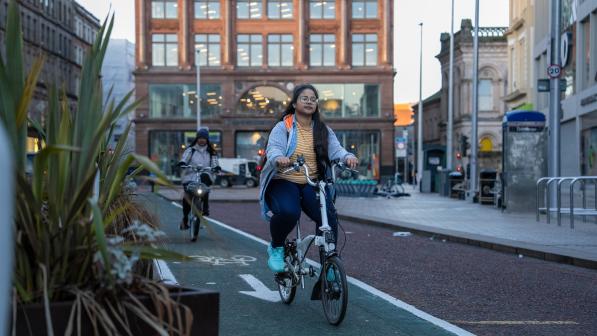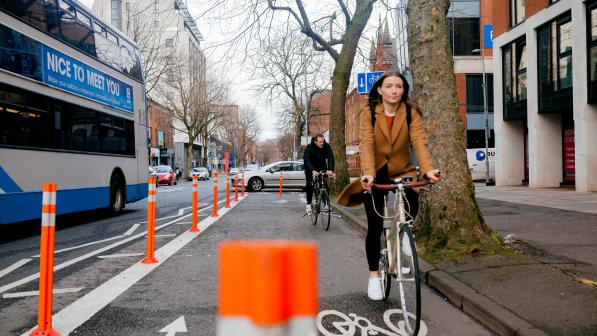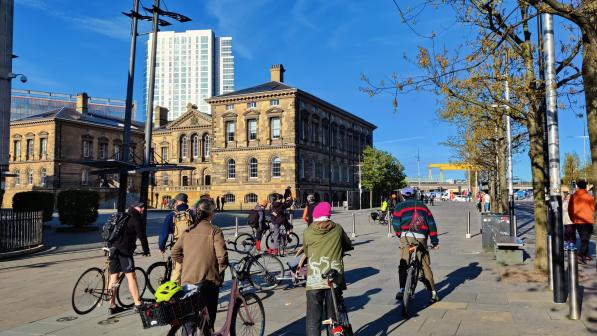Freedom to ride: the unconscious bias that’s limiting our transport choices

A Guinness World Record, the real-world impact of pedestrian priority, and the unconscious cognitive bias that shapes how we move – what more could you ask for from an afternoon with acclaimed environmental psychologist Professor Ian Walker?
We were delighted to co-host (alongside Queen’s University Belfast) Professor Walker during his visit to Northern Ireland. His schedule was as impressive as his achievements – with back-to-back events from the stunning Lanyon Building in Belfast to the equally picturesque Stormont Parliament Building.
Professor Walker has gained international recognition for his work on ‘motonormativity’ – or ‘car brain’ – the unconscious bias that treats car ownership and use as an unremarkable social norm.
In essence, society tends to overlook the harms caused by car dependency and struggles to imagine alternatives. His research challenges us to question why we continue to design systems that make driving easy but walking, cycling, or using public transport unnecessarily difficult.
Freedom of movement
I was honoured to open the event in the Members’ Room at Stormont, sharing some personal reflections on what transport freedom means in my own life. I spoke about the choices available to my family in Belfast.
I’m lucky: I live close to two of the city’s best active travel routes – the Lagan Towpath and the Connswater Greenway – and can reach the city centre in 15 minutes by bike or 20 minutes by bus. My eldest child’s school is only a short walk away (a few extra minutes when the toddler joins).
We also own a family car, which makes longer trips and visits to the in-laws in Dublin a bit easier!

But this level of freedom isn’t universal. I compared my experience to my partner’s. She also cycles to work but takes a route over a third longer than the most direct one – simply because it’s safer and more pleasant.
It made me ask why, in a city centre, someone should have to go significantly out of their way just to stay safe, all to maintain the convenience of motor traffic. After dark, she’s also less confident cycling, walking, or using public transport – reflecting the wider gender gap in active travel across our towns and cities.
Then there’s the next generation. I spoke about my children, and how long it might be before they can move around independently: to take the bus, walk to a friend’s house or simply explore.
They’ve already had two near misses on the footpath outside our home: once from a pavement parker and once from a driver pulling into a driveway without checking. The way we’ve designed our streets has a direct impact on how free our children are to move around their own neighbourhoods.
Transport inequality
Following my remarks, People Before Profit MLA Gerry Carroll, Deputy Chair of the All-Party Group on Active Travel, spoke powerfully about the inequality embedded in our transport systems.
He highlighted how car dependency reduces access to opportunity for those without the means to drive, and how fair, affordable public transport is key to addressing that imbalance.

Gerry has long been a vocal advocate for active travel and for breaking down the transport barriers that continue to disenfranchise working-class communities.
Professor Walker’s keynote speech was thought provoking and evidence led.
Using a simple but striking example – how a two-minute delay, at a pedestrian crossing for example, can reduce the number of destinations within a 15-minute walk by 25% – he showed how even small design choices can dramatically limit people’s freedom to move.
The question he posed was deceptively simple:
Why do we keep adding friction for people outside cars, while removing it for those inside them?
The answer, he explained, lies in what he calls motonormativity: the unconscious bias that treats driving as the default mode of transport, while other forms of movement are seen as less important or even optional.
The effect of motonormativity
This bias shapes everything from individual attitudes to public policy. We suspend rational decision making when it comes to the harms caused by cars, viewing crashes, pollution and congestion as inevitable rather than preventable.
Professor Walker explained that this ‘car brain’ isn’t something we consciously choose. It’s the product of lifelong exposure to environments that normalise driving and subtly devalue other ways of getting around.

From how our streets are designed to how travel is portrayed in the media, the message is consistent: roads are for cars first, and everyone else must fit around them.
Yet, as he pointed out, many people want change – cleaner air, safer streets, more choice – but we assume others don’t. This “pluralistic ignorance” keeps us stuck. By breaking that silence and showing that the desire for fairer, more balanced transport systems is widely shared, we can unlock political and social momentum for change.
Professor Walker left us with the thought that, if motonormativity operates at every level – from the language we use to the laws we pass – then that’s where change must begin.
We need to look at the big picture: update policies, infrastructure and messaging so that walking, cycling and public transport become the easy, natural options. Once that shift begins, individual behaviour will follow.
Following Professor Walker’s talk, we welcomed a broad range of key voices in the field for an engaging discussion on transport freedom and how it can be delivered for Northern Ireland.
Panellists included Mike Lorrimer from The Inclusive Mobility and Transport Advisory Committee (IMTAC), Anne Madden from the Walk, Wheel and Cycle Trust (formerly Sustrans) and Anthony Rafferty from the Department for Infrastructure.



